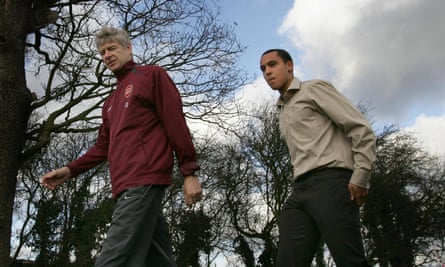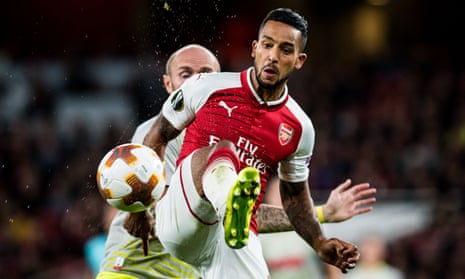In the end the writing on the wall was spelled out boldly enough for Theo Walcott to recognise the comfort zone was not really that comfortable at all. Perhaps the most surprising thing about the departure of a forward who spent more than a decade at Arsenal, mostly in this strange space where he grew older and signed new contracts while being judged about how far he was – or ever could reach – on the potential fulfilment scale, is that he uprooted at all. Walcott has in some ways been a perfect symbol of the later Wenger years: flashes of undeniable talent mixed with unreliability, a sense of sticking with the same old familiar tune rather than finding a way to fire up the rhythm.
Walcott always looked like the last person who would want out of Arsenal. It was a good life for him and his family and, as a decent and polite sort, he tended to prefer to play safe rather than agitate. The message this season, however, encouraged him to make a break for it and seek a new challenge. He could not get more than 63 minutes of Premier League football during a period where the team have struggled. Last weekend at Bournemouth, with no Alexis Sánchez, Mesut Özil or Olivier Giroud, the manager picked Danny Welbeck and Alex Iwobi to support Alexandre Lacazette in attack. Last season Welbeck and Iwobi scored four goals each. Walcott delivered 19. They were trusted to start and he was not. There was not much comfort to be found on that bench.
The market for established, late-20s attackers is the dominant theme of this January transfer window and Walcott’s value to Everton at £20m is interesting. He will turn 29 in a couple of months. He is three months younger than Sánchez and three months older than Pierre-Emerick Aubameyang. Walcott moves at an age where generally players are supposed to be at their peak, fully formed and ready to go. But the intrigue is in whether new surroundings, new expectations and a very different type of voice giving instructions and motivation can inspire something extra, propelling the same old Theo to become new Theo even at a relatively late stage of his career.
The fulfilment of potential will always be the subtext in the Walcott story, the underlying question. That notion was amplified way back, when Sven-Göran Eriksson had a chat with Arsène Wenger and, perhaps influenced by the reputation the Arsenal manager had during that era for identifying and developing outstanding young talent, suddenly selected this untried kid to join the 2006 World Cup ride. That expectation became a thing, enhanced when Walcott took Thierry Henry’s No 14, a gargantuan shirt to fill for a youngster with pace who spent time being educated on the wing before the anticipated push into the centre-forward position.
It remains weirdly difficult to assess Walcott’s 12 years at Arsenal because of this lingering dilemma between judging what he did well against what might have been better. On the shiny side of the coin he won three FA Cups – a sharp, instinctive finish to open the scoring in the 2015 final at Wembley was one of those high points which reignited the idea that a more driven, influential Walcott was ready to break out. He scored more than 100 goals for one of England’s historic clubs. He gathered 47 England caps.

Everton can look at the highlights reel and wonder if more of the plus points can be harnessed. A breathtaking run to assist a goal for Emmanuel Adebayor in a Champions League game at Anfield still looks thrilling. Then – gulp – you realise that was actually nearly 10 years ago.
Those wonder-moments were like trailers, giving a flavour, a sense of possibility, but it was the difficulty in translating it into a compelling long movie that explains how his Arsenal years will be remembered with a mix of fondness and frustration. Walcott arrived at the club when Wenger had such impressive form for progressing young talent. Joining Arsenal then seemed a natural fit for a young player who wanted to learn and improve. Recent distinguished examples included Cesc Fàbregas, Robin van Persie, Gaël Clichy and Kolo Touré.
Walcott in some ways became emblematic of the group that did not flourish as much as everybody hoped. The current team has a bunch who are treading developmental water, maybe even swimming against the tide, in that players such as Héctor Bellerín, Rob Holding and Iwobi look less assured than they did when they broke into the first team.
Walcott’s length of service can be interpreted as a sign of how modest performances are indulged by the culture of complacency that comes from the top at the club. Still, it says something about his niceness and upstanding behaviour that he heads north to Goodison Park with many good wishes from Arsenal and will be welcomed back warmly when the teams meet in a couple of weeks.
One thing that Sam Allardyce will look to quickly transform is Walcott’s confidence. That drained this season as game time was severely limited. New club, new expectations, he leaves with a Theo-esque fond farewell to the comfort zone.

Comments (…)
Sign in or create your Guardian account to join the discussion